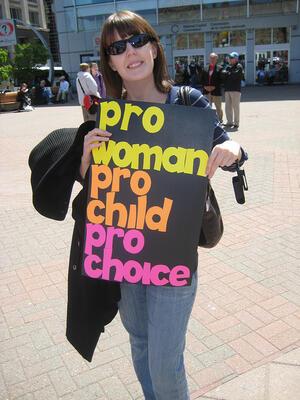The name may change but the belief stays the same
Ottawa Pro Choice Presence at the 2010 National March for Life.
Photo by Jenn Farr via Flickr
Not surprisingly, the 40th anniversary of Roe v. Wade kicked up a great deal of dust. In early January, Planned Parenthood announced that it will abandon the term "pro-choice" to describe people who believe abortion should be every woman's right; on January 25th, tens of thousands of activists gathered on the Mall in Washington, D.C. for the annual Walk for Life. One of our regular guest bloggers, high school student Talia bat Pessi, shares her thoughts on the issue.
As an Orthodox Jew, I find that my fellow feminists are often wary around me when it comes to abortion politics, since they are unsure whether or not my religion allows me to support choice. The simple answer is that I am completely and totally behind Roe v. Wade. I strongly believe that it is imperative that abortion is legal, safe, and accessible to every American woman, regardless of class, race, or any other factor.
There is a more complex answer, though. According to halakha (Jewish law), a woman may only have an abortion if her life is at risk. This is derived from the halakha that if somebody (in this case, the fetus) is trying to kill someone else (the mother), the pursued must kill the pursuer to protect him or herself. Because of this, I would never personally have an abortion, unless both my rabbi and doctor agreed that was necessary, God forbid.
However, I would never dream of imposing my own personal beliefs onto every American woman. Even if I disagree from a religious standpoint, it’s not any of my business if a woman wants to have an abortion. There has to be a separation between church and state; religious beliefs have no place in American law, whether they’re my own or somebody else’s.
My mother recently told me that her aunt had an abortion when she was younger. My great-aunt survived the Holocaust with her mother, sister (my grandmother), one of her brothers, and husband. Eager to repopulate the decimated Jewish nation, she gave birth to a daughter and son in a Displaced Persons camp in Germany. (“When I was little, we would always joke that her son could never run for president because he wasn’t born in America,” my mom said, interrupting the flow of her own story. “But the daughter also couldn’t run for president, if she wasn’t born in America,” I said. “We didn’t think in terms of women being president in the 1950s,” my mom explained.) After my great aunt came to America, she became pregnant again. She was an immigrant fresh off the boat, unfamiliar with the language or customs of her new country, taking care of two small children, and dealing with a husband whose income wasn’t yet stable. I imagine that she weighed all of these factors, plus some more that I’m not privy to, and decided that a third child would be irresponsible. She went with her mother (my great-grandmother) to get a back alley abortion.
If you like this post, you're sure to enjoy:
My great aunt has had Alzheimer’s since I was a little girl, so I was never able to ask her about this decision, nor will I ever be able to. However, having heard stories about her from my mother, I have to think that she supported Roe v. Wade and would believe in every woman’s right to a legal, safe, and accessible abortion.
At the end of the day, as much influence as a woman may give to her husband, boyfriend, parent, clergy member, or other individual when it comes to deciding whether or not to have an abortion, the only person who can make the decision is the woman herself. And that’s the way it’s supposed to be. Her body, her choice. No governmental interference allowed.







Thank you, Cecily Routman, for founding the Jewish Pro-Life Foundation. Thank you, Erica Sager Pelman, for founding In Shifra's Arms to help Jewish girls and women with unplanned pregnancies. There really is a choice.